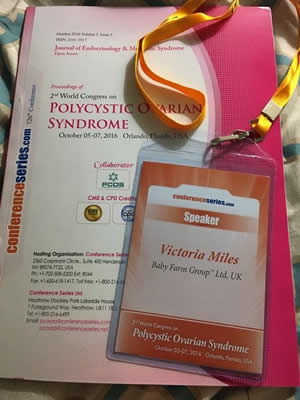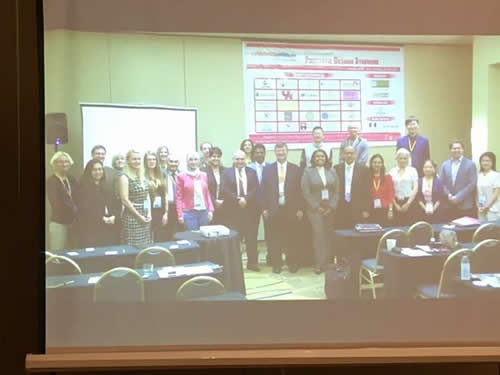Positive Health Online
Your Country

Reflexology, Fertility and IVF
listed in fertility, originally published in issue 236 - February 2017
Recently there has been much negative press over IVF. This is such a shame because for some people it will be the only way they can achieve pregnancy. So much as I am always inclined to encourage my clients to follow a more natural approach, it frequently has to work hand in hand with medical intervention. Let me stress how brilliantly complimentary to each other this combination can be.

In very simple terms IFV’s function is to collect eggs, mix with sperm and produce embryos that are placed in the woman’s uterus with a view to hopefully growing. Of course there is far more to it than that, but this is effectively what happens. The clinics to the greater extent will presume you as a patient are taking care of your emotional and lifestyle needs on your own. Some, but very few offer the option of a more holistic approach. If indeed it is an option the cost of treatment rockets, making it impossible for most to afford. This is often not the case, standard treatment will offer a basic level of counselling but that’s to meet the legal standard of practice in the UK, and IVF patients feel vulnerable and at a loss over how they can manage the things that go hand in hand with a positive result.
This is where finding a brilliant natural fertility therapist or clinic comes into its own. Let’s look at some examples.

Picture of Author with Beth
Beth was what any practitioner would recognize as a typical PCOS case in a physical sense. Higher BMI, facial and body hair growing in dark patches, her hair line was thinning, but not in an obvious way and her periods sporadic to say the least.
She and her new husband decided they wanted to start a family. They approached their family doctor in 2005 when Beth was 28 as they knew things weren’t quite right. A scan revealed a 5lb fibroid in Beth’s uterus; surgery was organized to remove this. Because her BMI was greater than 30 she was not accepted for further investigation so had two choices: lose weight or seek alternative intervention. They needed to save for a visit to an expensive private fertility clinic. Meanwhile we started a lifestyle plan to help with diet, stress and, nutrition.
At this point I had not begun to use natural supplements but I was aware that far too many people have intolerances that they ignore. My nutritional training meant I was well placed to see that this was playing a big part in the struggle to conceive for many.
We moderated Beth’s diet and exercise routine and she then had successful surgery. The Consultant suggested she might still need further intervention because of her weight. Working with Beth lasted only three months as she fell pregnant naturally and had a son 9 months later.
I have and always will disagree that weight is a major contributory factor with fertility problems. Nutrition is the factor but not weight. As I say to my clients it is this ***Hand to Mouth Gesture*** that matters.
Indeed, it is far more difficult to get an underweight person to eat more than it is to help a person with a higher BMI to moderate their nutritional intake to ensure a good balance of foods. Lets’ face it, we are all different shapes and sizes. Not everyone is blessed with a perfect size 6 - that’s a UK size 10 and actually many women are happy having curves à la Marilyn Monroe. Indeed, in the UK today the average dress size is an 18, which is US size 14. Also in Wales, UK where I come from, over 60% of adults are considered to be clinically obese. I never ask my clients to diet, however if they ask me to support them with getting a slimmer look I am more than happy to suggest foods that will encourage weight loss as well as improved fertility.

Guest Speaker 2016 Annual PCOS Convention Orlando
When I speak at varies conferences - most recently the annual international PCOS conference in Orlando a few months ago I notice as few shocked faces in the audience when I said “I believe weight is not an issue, but nutritional intake is.”
Let me just clear up why I take this stance. As a world we are obsessed with being rich, skinny and beautiful. It is as realistic as Disney........
The average Joe like me is never going to be able to compete with what the media sells us. So, my primary focus is to get to understand the person I’m consulting without putting them on the defensive with a weight based interrogation. It is also worth noting that over 90% of my clients are considered clinical obese, and my success rate is 90% also - with PCOS [polycystic Ovarian Syndrome] clients - in the last 12 months. My success rate with Endometriosis clients is 100% and also over 90% with my ‘unexplained infertility’ clients.
I can hand on heart tell you that the percentage who did not conceive are all undergoing IVF and have failed on previous attempts before coming to Baby Farm. They are also the individuals who have refused to follow nutritional advice and have enjoyed the hands on therapies, but not wanted to invest in the plan further.
Let’s look at some of the other important factors that apply to fertility regardless of the way you are choosing to conceive.
- Water intake needs to be between two and three litres a day, seven days a week, 365 days a year;
- Eating breakfast every day within 30 minutes of waking kick starts your metabolism and gets the body removing toxins and transporting necessary hormones;
- You must be engaging in intimacy on a very regular basis. Like 4+ times every week right throughout the month, every month, unless there is a medical reason to abstain. The only way to be sure you are catching ovulation is to have intercourse as frequently as possible, not just when you think ovulation might be occurring;
- Exercise is also hugely important. However to sustain it long term you must choose you activity carefully. Again, because this needs to be a continuous part of the weekly routine.
Stop starting all of these things can and will affect the body’s ability to maintain healthy levels of hormones and of course this affects conception.
I am sure that the light bulb has come on for lots of people whilst reading this, and that is fantastic.
Without the benefit of a natural treatment plan alongside the medical treatments many of my clients stories would no doubt have been very different. Many came to Baby Farm as a last resort. They are beyond medical intervention, have seen multiple failures and desperation has set in and they will try anything. This saddens me deeply as the whole journey has played out in reverse.
Teach people to manage their lifestyles within their own comfort zone.
Look after your body and mind to the best of your ability so should the need for medical intervention arise you have all of the necessary factors in place to allow your body to respond in a positive way.
Comments:
-
No Article Comments available